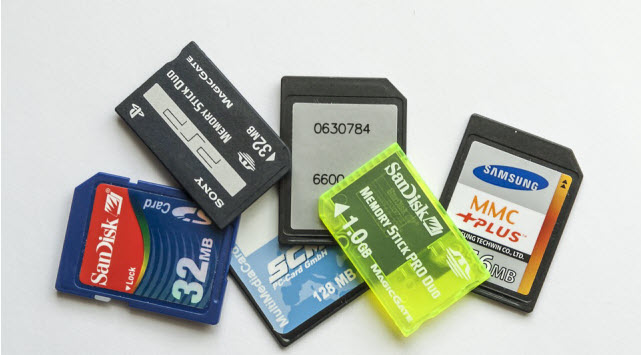
We understand the uneasiness you feel, when you are in the word of memory cards and deciding out which card to buy, what parameters should be considered could confuse you more . Well, here’s a quick guide on essential things you need to know before buying a memory card.
#1 Choosing the Right Memory Card Type
There are two aspects to check while selecting the memory card: One is how you are going to use the card and another is, on what type of device you will be using it.
If you are looking for a memory card for your Smartphone, tablet, or any entry level camera, then a basic and a less expensive card like a micro SD card will be a great option. In case your wish is to take pictures or videos having a higher resolution like 4K Ultra HD, then go with high-speed cards with more memory such as Speed Class 10.
#2 Check for Compatibility
Before you spend your hard-earned money on a new memory card, check which type of card your device will use.
Memory cards are available in various formats, and you’ll need to choose the format that best suits to your device. Most of the latest cameras, Smartphones and other devices use SD (Secure Digital) cards or micro SD cards. Further, SDHC (Secure Digital High Capacity) and SDXC (Secure Digital High Capacity) cards are meant to store a lot of photos and videos in comparison to SD cards. But, these cards don’t fit with older devices. So, you’ll have to cross check whether these cards are compatible with your device or not before purchasing.
Another format of memory cards is Compact Flash card or CF card, one of the traditional card that is still in use. However, this type of card doesn’t suit to basic and medium level DSLRs but may go well with high end and professional camera models.
Important NOTE: Trying to use a card on incompatible device may damage your card file system and makes it inaccessible. With this even your files in the card will be inaccessible. In such cases you may have to rely on card recovery tool like Remo Recover software to recover your data from damage memory card or SD cards. Hence, cross check your device manual to know the type of card it supports and purchase the right one.
#3 Checkout with the Capacity/Size You Need
First of all, you need to be aware of different sizes of card available in the market. Card capacity is usually measured in gigabytes (GB), and it indicates the quantity of pictures and videos you can save on the card.
Memory cards are available in 8GB, 16GB, 32GB, 64GB and 128GB capacities. It would be waste of money as well storage if you buy 32GB of card for your Point and Shoot camera if you are going to take few pictures a year. And also, it would be too small if you use 8GB of card on your flash memory camcorder if you are a professional photographer.
#4 The Speed of Memory Card Also Matters
The speed of the card (which is often overlooked) is one of the important parameters you need to consider when buying a brand new memory card. The speed of the card is nothing but how fast the files will be written to the card. Capturing 4K videos and high-resolution videos and pictures require a speedy card.
#5 The Right Card Reader
If you are willing to use your memory card on the computer, make sure the system has a card slot for the card you are going to purchase. If the slot is not there, you can purchase one card reader. Note that you have cross checked with the reader that it could be able to read your card. You can’t use 16 GB MicroSDHC card if the reader is to use a microSD card.
Now, you got a brief idea on what all you need to consider before purchasing a card. Whether for a phone, a digital camera, or some other device, purchasing a memory card seems like a very simple thing to do by now, right? Make sure you buy right card for right camera and as per the need.